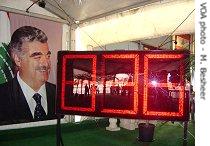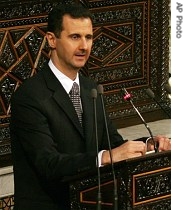2007年VOA标准英语-Analysts Say Hariri Assassination Tribunal is D(在线收听)
Washington
31 May 2007
The U.N. Security Council's decision to establish an international tribunal to prosecute suspects in the assassination of former Lebanese Prime Minister Rafik Hariri is a blow to the government of Syria and might spark a new outbreak of violence in Lebanon. Middle East analysts say the government in Damascus is concerned that high-level Syrian officials could be charged in connection with Mr. Hariri's assassination. VOA correspondent Meredith Buel has details in this background report from Washington.
 |
| A clock at the Prime Minister's tomb counts the days since his murder |
The assassination sparked huge demonstrations against Syria, which was widely seen as culpable.
Damascus denied involvement, but was forced to withdraw its troops from Lebanon, ending its nearly 30-year military domination of its smaller neighbor.
The Security Council's decision to create the criminal tribunal breaks a deadlock among Lebanon's feuding political factions over how to prosecute suspects in Mr. Hariri's murder.
The U.S. ambassador to the United Nations, Zalmay Khalilzad, acknowledged the council's action could trigger violence, but said the vote demonstrates the principle that political assassination is not acceptable anywhere.
"Those who killed Rafik Hariri and so many others will be brought to justice and held responsible for their crimes," he said. "The tribunal will also serve to deter future political assassinations."
The government in Damascus says it will not cooperate with the new tribunal, and pro-Syrian politicians in Lebanon criticized the Security Council's decision.
Lebanon's pro-Syrian president, Emile Lahoud, has warned creation of the court could lead to more bloodshed.
Syria's U.N. Ambassador, Bashar Ja'afari, says there will be consequences.
"Those who were behind such a draft resolution will assume the consequences," he noted. "But definitely this is something that goes against the interest of the Lebanese people and Lebanon as a whole."
The pro-western government of Lebanese Prime Minister Fuad Siniora asked the Security Council to create the court after the country's pro-Syrian parliamentary speaker, Nabih Berri, refused to convene the legislature to approve the tribunal.
Middle East analyst and author Barry Rubin has just published a book on Syria.
Rubin says the tribunal is a major threat to Syrian President Bashar al-Assad.
"Of course the tribunal on the investigation of their involvement in murder and terrorism in Lebanon is absolutely critical and to stop the tribunal is a very high level goal," he said. "I mean after all we should remember that among the people considered involved are the two closest people to Bashar, his brother and his brother-in-law. This is very dangerous for the regime."
A preliminary U.N. investigation implicated Syrian intelligence officials and their Lebanese allies in the plot to kill Mr. Hariri.
Theodore Kattouf, a former U.S. ambassador to Syria, says the international tribunal is an existential issue for the Damascus government.
 |
| Syrian President Bashar al-Assad speaks before Syria's Assembly House, also known as the parliament, in Damascus, 10 May 2007 |
In addition to Mr. Hariri's murder, the new tribunal will have jurisdiction over other cases, including more than a dozen political attacks against anti-Syrian journalists, scholars and politicians.
Analyst Barry Rubin says the court puts major pressure on both Syria and its allies, such as Hezbollah, in the Lebanese government.
"Syria has made a very high priority to kill the tribunal," he added. "Remember that Hezbollah walked out of the Lebanese cabinet, not over the poverty of Shi'ite Muslims in Lebanon, but over the government's intention to go ahead with the tribunal. This is a tremendous card, the most powerful card and the question is how it should be played."
Analysts say as the U.N. tribunal begins its work, bombings and other violence will likely increase in Lebanon.
Former U.S. Ambassador to Syria Theodore Kattouf says he is concerned that Lebanese citizens will suffer.
"What I fear is that once again the Lebanese people are going to get the bill," he said. "We are seeing it already and I think it may get far worse."
The Security Council resolution gives Lebanon's political factions until June 10 to settle their differences and establish their own court. If they fail, the U.N. tribunal will be created.
The resolution was adopted under Chapter Seven of the U.N. Charter, which authorizes the use of military force to support it.